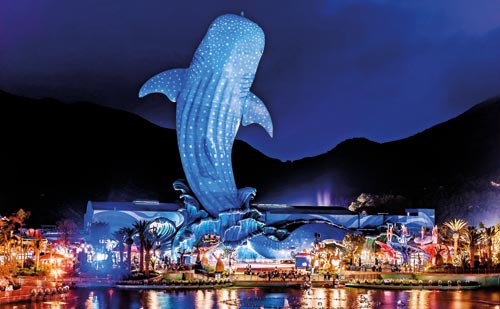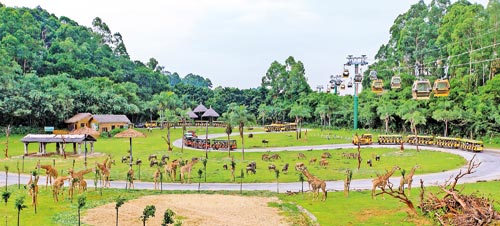Lessons on safari parks from China

Chimelong Ocean Kingdom
Armed with major skills and experience, a Sri Lankan expert on many things wild and also creatures in zoos, is urging Sri Lanka to think out of the box.
“We can envision a small safari park as well as a breeding centre for rare animals which would attract both local and foreign tourists so that the country can make much-needed foreign exchange,” urges expert Vasantha Nugegoda.
He is not making false claims, for as a Director and Consultant Zoologist to China’s Chimelong Group Fauna and Flora Department, he is well-versed in this type of work.
Vasantha’s role at Chimelong includes being a member of the designing team of the world’s second Night Safari in Guangzhou, China, in 2005. He had designed, conducted staff training and also helped select species for the Night Safari park. This is while he had also been a member of the Singapore Zoo and Night Safari creative design team earlier, when he was employed with the Singapore Zoo.
Vasantha is confident that Sri Lanka can be home to a small Safari Park, as he points out that with his experience of working and seeing world zoos he does not think that any country, other than China, could do it on the scale of Chimelong. This is because the country should not only have a large population but people should also be able to afford the entrance fee.

Safari on Wheels. Pix courtesy of the Chimelong Group
Delving into detail how Sri Lanka could set up a small Safari Park, he says that it would be vital to select the species which would inhabit such a park depending on location, climate and terrain.
“Thereafter, the natural herd numbers of individual animal species to be exhibited would have to be selected and the naturalistic habitat needed for such individual species based on behaviour would have to be designed,” says Vasantha, reiterating that it would also be “very” important to select the “right” staff, honest, disciplined and who have a love for animals.
The management staff would have to undergo hands-on cross training, it is learnt and a land which can be converted to a farm to grow the food needed by the animals should also be demarcated.
Giving the backdrop to the Chimelong Group, Vasantha says that it has created and is managing many wildlife protection and education organizations and parks. It also collaborates in many conservation projects in China, approved by the Chinese government.
The Chimelong Safari Park (CSP) had been opened in December 1997; the Chimelong Bird Park in 2004; the South China Rare Wildlife Species Conservation Centre in 2012; the Chimelong Ocean Kingdom in 2014; the National Ex-situ Conservation of World Endangered Wild Plants and Animals Centre & the South China Tiger Breeding and Reintroduction Centre in 2015; the China Conservation and Research Centre for the Giant Panda in Guangdong in 2016; and the Chimelong Spaceship in 2023.

Vasantha Nugegoda
Vasantha picks out CSP which has become a “world-class national tourism brand” with over 400 species and around 20,000 specimens of animals from all over the world. It is visited by over six million people annually.
CSP also comprises a fully-equipped Animal Hospital and Animal Food Centre including a forage farm.
Portraying a subtropical and tropical landscape, it has to its credit – successfully breeding the giant panda triplets, the koala twins, the South China tiger, the Asian elephant, the white & black rhinoceros, the pygmy hippopotamus, the tapir, the giant anteater, the snub-nosed monkey, the chimpanzee, the langur, the gibbon, the lemur, the komodo dragon, the scarlet macaw, the crested ibis, the crane, the flamingo and more.
Visitors can use different modes of transport such as the ‘Safari on Wheels’, the ‘Safari on Foot’ and the Cable Car Tour.
Moving onto the Chimelong Ocean Kingdom which exhibits more than 70 species and over 1,000 aquatic animals, he says its highlight is the magnificent Whale Shark Aquarium.
Finally, Vasantha looks at the South China Tiger Breeding and Reintroduction Training Centre in Qingyuan, Guandong Province, the core project of the Chimelong Plants and Animals Conservation Base.
Referring to it as China’s first large-scale public welfare project for wildlife conservation solely invested in by a private investor, he says that since 2016, live animals such as fallow and sika deer, goats, antelopes, chickens, rabbits and others have been introduced into the area to prepare the tigers for reintroduction training.
It had been in 2018 that Chimelong introduced four South China tigers for breeding and reintroduction training, with two cubs being bred successfully in June 2021. In 2019, meanwhile, Chimelong had selected white tigers in good physical condition to carry out a semi-wild training pilot. To the excitement of all, two white tiger cubs had been born outdoors in September 2021.
| Yala concept needed for Hambantota Safari Park | |
| “Very sad and disappointing from the information I see from the media and hear from the public including local and foreign friends who love and care for animals,” is Vasantha’s reply, when asked what his views are on the Hambantota Safari Park.He had visited the park soon after it was opened and could not believe the money spent on public facilities and the small habitats created for the animals, ignoring basic design concepts for safari parks including in the animal holding buildings and service facilities and fences.Switching to the Dehiwela National Zoological Gardens, Vasantha says that it was world class earlier. See what it is today, he asks, pointing out that he does not think he needs to explain. The Chimelong Safari Park had given all the animals requested by the Dehiwela Zoo, under an animal exchange programme, but how many animals have been bred from that shipment and how many are still alive now, he asks. He says that for Sri Lanka’s Dehiwela Zoo, Hambantota Safari Park and Pinnawela Elephant Orphanage to be taken up to world standards, all the suffering exotic animals should be transferred from the Safari Park to the Dehiwela or Wagolla Zoo. The Safari Park should be developed on the concept of the Yala National Park and include a halfway home for animals, like the Chimelong Tiger Rewilding Project, where animals roaming in the wilds of Sri Lanka would be included. “This will give an opportunity to locals and foreigners, especially Kataragama pilgrims, to see our fauna and flora and prevent overcrowding at the Yala National Park,” he adds.
|
Searching for an ideal partner? Find your soul mate on Hitad.lk, Sri Lanka's favourite marriage proposals page. With Hitad.lk matrimonial advertisements you have access to thousands of ads from potential suitors who are looking for someone just like you.


